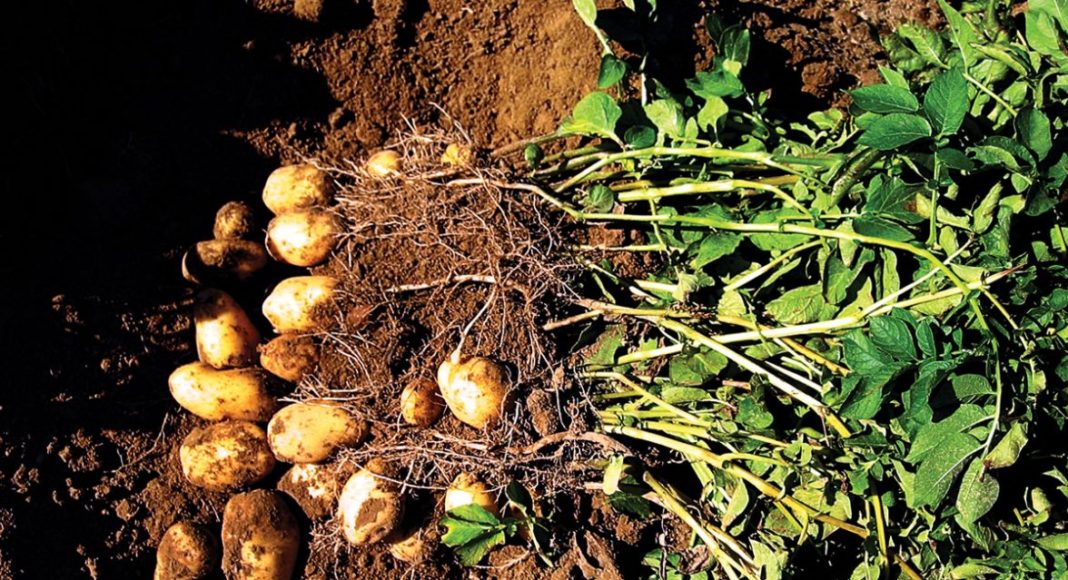[deck]Organic potato producers face the same pest challenges as other producers, but must deal with them using a vastly different array of solutions.[/deck]
Potatoes are one of the most difficult crops to grow organically; however, the presence of organically-grown potatoes on store shelves demonstrates that it can and is being done. Since neither traditional pesticides nor genetically modified varieties are allowed within the scope of organic production, pest control involves an array of options not commonly associated with traditional potato production, including biopesticides, biodiverse crop rotation and natural foliar feeding.
Organic potato producers are facing most of the same pest challenges as conventional producers. The main pest on most producers’ radar is the Colorado potato beetle. However, other pests also have an impact on organic potato production, whether due to lack of chemical control or increased presence in Canada.
Potato leafhoppers and tarnished plant bugs are causing the most harm in dry conditions. Meanwhile, wireworms are posing major problems for producers across the country, especially in fields coming out of sod. Adult wireworms do not attack potatoes, but the larvae feed on potato seed pieces and daughter tubers.
In addition, the potato flea beetle is also a growing concern. Flea beetles lay their eggs at the base of plants in the spring, and the small larvae that emerge feed on tiny root hairs. Damage is not usually important in the spring when the plant is growing vigorously, but it can be severe in the fall when organic producers have fewer control options.
Aphids pose less of a problem to organic potato production than to conventional production, because their populations can escalate after the use of insecticides has eliminated natural predators. In organic production, the abundance of predators and fungi that attack aphids are not destroyed by chemicals.
Chemical pest control measures exist for most of these pests, but organic potato growers must find other solutions to prevent and combat them.
A Solid Foundation
Most organic producers across the country say the same thing—that one of the cornerstones of organic production is healthy soil. “Healthy soil [grows] healthy plants that are better able to ward off pest pressure,” explains Brent Harris, owner of Fraserland Farms, an organic operation in British Columbia.
“Treating the soil well with balanced nutrition, a biodiverse crop rotation—potatoes do well after a plowdown of alfalfa or clover—minimized tillage, and, of course, no harsh pesticides or fertilizers will lead to strong, healthy potato plants that can withstand diseases and pests,” adds Isaiah Swidersky, an organic producer and owner of Rose Mountain Farm in Alliston, Ont.
But a good foundation doesn’t end with the soil. Swidersky says foliar feeding is one way to provide nutrients to plants in-season. This involves applying a natural organic fertilizer directly to the leaves at different intervals. It’s a win-win method, as it also provides some resistance to pest infestations.
Swidersky, who successfully produces red, white, blue and yellow certified organic potatoes, says integrated pest management is also essential to organic production. “Without the use of strong chemical pesticides, we have to identify crop pests and diseases quickly and deal with them immediately. Prevention is the key,” says Swidersky.
“IPM is a must,” agrees Harris. “It allows us to detect problems at the very start, when they are still manageable, with the limited number of tools we have available.”
Certified seed is also critical to organic operations. “Quality certified seed is used to minimize transfer of pests and disease into our potato crops,” says Swidersky. “Choosing varieties that are tolerant to diseases and pests is key.”
Alternatives to Chemical Pesticides
As of yet, there are not a lot of biological pest control products to choose from in Canada. The most widely-used product is insecticidal soap, which Swidersky and Harris say they both use.
“I use insecticidal soap for leafhopper and tarnished plant bug control,” says Swidersky. “Entrust can be used for Colorado potato beetle control. And there are some good products available from Advancing Eco-Agriculture that help to repel insect pests.”
Entrust, which is produced by Dow AgroSciences, contains the active ingredient spinosad and is created through the fermentation of living organisms. This fermentation technology results in a compound labelled for organic use that combines the powerful efficacy of most synthetic insecticides with the environmental benefits of most biological insecticides.
In terms of other biopesticides, the best options right now may be products containing Bacillus thuringiensis, a naturally-occurring soil bacterium that produces a biological insecticide when it is fermented. The bacteria form spores that are killed before being made into commercial pesticide products. When they form spores they also produce a crystal-like structure that is toxic to certain groups of insects. Some examples of products available in Canada include DiPel and Foray by Valent, Bioprotec by AEF Global and BTK Insecticide by Safer’s.
Harris says that on his farm, they have learned to allow a strong bank of natural predator insects to keep harmful pests at bay. Natural predators are not sufficient to reduce beetle populations in the field, but biological control is possible. For example, it has been shown that multiple releases of stinkbugs at the beginning of the beetles’ egg-laying phase can be as effective as chemical pesticides. In trials conducted in New Brunswick, egg masses were reduced by 50 per cent and larvae by 90 per cent with multiple releases of stinkbugs.
It is also possible to favour the spread of naturally-occurring diseases. Beauveria bassiana is a fungal disease that attacks beetle adults and larvae and is the main ingredient in a biological insecticide called BotaniGard. It is registered in Canada, but is not currently allowed for use in organic production.
While there is no fail-safe method available for organic control of the insects that affect potato production, there are numerous options available that offer some degree of protection. Ongoing research and on-farm experience will continue to improve the options available and make organic control more effective and economical.
Resistant Varieties
One of the most critical areas of research will be the continued development of varieties that are suited for organic methods of production. Swidersky says his farm has experienced success growing certain disease-tolerant varieties, as well as varieties that withstand the elements better, which is critical for organic operations that can’t rely on fertilizer.
“We grow a processing variety that has good scab tolerance and performs relatively well in drought and low fertility conditions,” he says. “Chieftan and Agria are vigorous varieties for the table market.”
However, breeding for pest resistance is still very much a work in progress. Currently, varieties with improved resistance to the Colorado potato beetle and acceptable yields and quality are being tested. Trial results have shown that these varieties suffered only half of the damage incurred by Russet Burbank potatoes planted in the same plot. This is not complete resistance, but when combined with other methods of beetle reduction, the use of resistant varieties may be enough to reduce damage to acceptable levels.
The evolution of organic production methods will require a tremendous ongoing research effort in all aspects of pest and weed control. However, the magnitude of the growth in sales of organic produce makes organic production difficult to ignore. While organic production will not be for everyone—Harris says organic growers must be open to different ideas and not just have the mindset of “what will I use to replace what I am now not able to use”—it is certain that in the future, producers with the appropriate set of skills and marketing plan will be successful in this new area of food production.
“If you are a careful crop manager, you can learn to grow organic potatoes,” says Swidersky. “There is no room for poor management in organics, as there are no quick solutions in a jug available that can correct pest or disease problems that pop up mid-season.”











